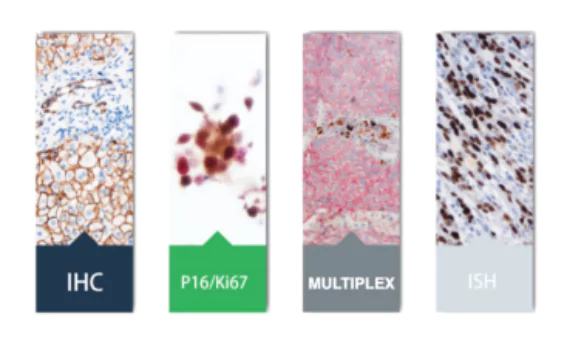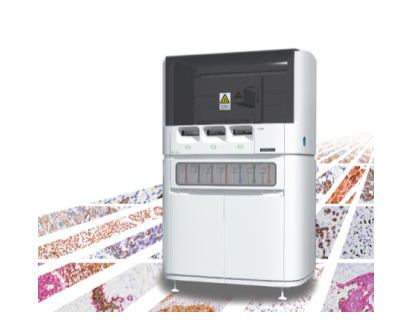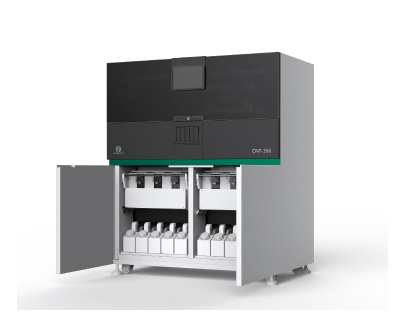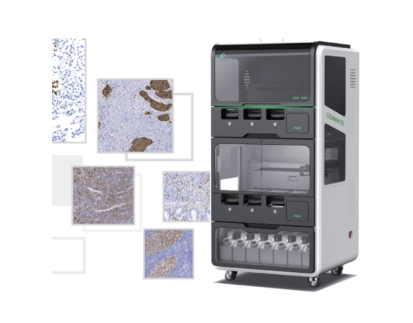Enhancing Diagnostic Accuracy with CNT330 Full Automatic IHC Stainer

By admin
One of the key technologies used in the field of pathology is immunohistochemistry (IHC), which involves the detection of specific antigens in tissue sections. The introduction of automated systems has revolutionized this process, enhancing efficiency and reproducibility. Among these systems, the CNT330 Full Automatic IHC Stainer stands out for its innovative approach to improving diagnostic accuracy through advanced automation and user-friendly design.
Overview
The importance of IHC in pathological diagnosis
Immunohistochemistry plays a pivotal role in the pathological diagnosis process. It enhances the visualization of specific proteins within tissue samples by using antibodies tagged with dyes or enzymes, allowing for clear identification of cellular components. This technique is essential for diagnosing various diseases, including cancer, where the presence or absence of certain markers can directly influence treatment pathways. The precision of IHC contributes significantly to the accuracy of diagnoses, making it a standard procedure in modern pathology labs.
Background and Significance of CNT330
The CNT330 Full Automatic IHC Stainer represents a significant advancement in the automation of IHC processes. Developed with cutting-edge technology, this stainer is designed to streamline staining procedures while maintaining high standards of accuracy and precision. The significance of the CNT330 lies not only in its ability to perform multi-IHC staining but also in its contribution to laboratory efficiency. Its introduction has been marked by a growing acceptance in pathology labs that demand rapid and reliable results without compromising on quality.
Key Features of the CNT330 Full Automatic IHC Stainer
Enhanced Accuracy and Precision in Staining
The CNT330 Full Automatic IHC Stainer is engineered to deliver exceptional accuracy in staining. Its advanced calibration systems ensure that each staining step is consistently optimized, leading to reproducible results across different samples. The machine minimizes human error, allowing technicians to focus on interpretation rather than manual handling. The result is a higher standard in histopathological analysis, providing clinicians with reliable information crucial for patient management.
Increased Efficiency and Throughput
The CNT330 isn’t just about accuracy; it is designed to improve laboratory throughput significantly. With a staggering throughput of up to 60 slides completed in just 2.5 hours, the stainer meets the increasing demands of modern pathological workflows. This level of performance is critical in settings where rapid results are necessary for timely diagnoses and treatment decisions.
Streamlining Workflow Processes
One of the standout features of the CNT330 is its ability to streamline workflow processes within the lab. By automating repetitive tasks associated with IHC staining, the system reduces the need for intensive manual labor, allowing staff to engage in more complex diagnostic responsibilities. This optimization not only aids in maximizing the utilization of personnel but also contributes to a more organized lab environment where processes are clearly defined and efficiently executed.
Reduction in Turnaround Time
With the implementation of the CNT330 Full Automatic IHC Stainer, laboratories can expect a notable reduction in turnaround times for staining procedures. The automation of the staining protocol accelerates the overall workflow, ensuring that results are available faster than ever before. This attribute is especially beneficial in clinical settings where quick decisions are needed based on histopathological findings, ultimately leading to better patient care. The sophisticated system boasts continuous operational capability, facilitating the simultaneous loading of up to 30 slides across three independent frames. It offers a seamless, fully automated workflow that encompasses critical steps such as slide drying, deparaffinization, antigen retrieval, and various other processes, thereby promoting standardization and enhancing operational efficiency within laboratories.
Celnovte
Evolution and Milestones of Celnovte’s Innovations
Celnovte‘s journey in the field of medical diagnostics is marked by numerous innovations aimed at enhancing laboratory efficiency and diagnostic accuracy. The introduction of the CNT330 Full Automatic IHC Stainer is a milestone that underscores the company’s commitment to advancing immunohistochemistry practices. Over the years, Celnovte has consistently focused on integrating technology with medical needs, leading to the development of machines that not only meet but exceed industry standards.
The emergence of the CNT330 Full Automatic IHC Stainer is just one example of how Celnovte is transforming the diagnostic landscape. By centralizing complex procedures into a user-friendly system, the company is reshaping the way pathologists approach immunohistochemistry. With the ongoing advancements in automation and technology, the future of diagnostic accuracy is bright, allowing for more informed clinical decisions and ultimately improving patient outcomes.
Applications in Various Diagnostic Scenarios
Rapid Intraoperative Immunocytochemistry
The CNT330 Full Automatic IHC Stainer finds its highest utility in intraoperative scenarios where rapid immunocytochemistry (IHC) is a necessity. In surgical settings, obtaining timely results can be crucial, especially when decisions regarding tissue removal or extensions of resection depend on the status of malignancy. The CNT330’s ability to streamline processes enables rapid staining that can be completed in a fraction of the time traditionally required, significantly impacting patient care during surgeries. This rapid response capability aids surgeons in making informed decisions in real-time, minimizing the chances of incomplete tumor excision and subsequently improving overall patient management.
Moreover, the precision offered by the CNT330 ensures that the results derived from intraoperative staining are reliable. The automated process reduces variability typically associated with manual staining techniques, thus enhancing the overall quality of diagnosis. The application of this technology in the operating room serves to bridge the gap between surgical intervention and diagnostic certainty, identifying markers that are critical to guiding postoperative care. Consequently, the integration of the CNT330 into intraoperative protocols can lead to more effective therapeutic strategies tailored to individual patients.
Utility in Central Nervous System Diagnoses
The application of the CNT330 Full Automatic IHC Stainer is particularly noteworthy in the context of central nervous system (CNS) diagnoses. CNS pathologies often require meticulous evaluation to identify various tumor types, as well as inflammatory and degenerative disorders. The automated IHC staining process facilitates the detection of specific biomarkers associated with different CNS conditions, which is essential for accurate diagnosis and tailored treatment. Through enhanced staining consistency and accuracy, pathologists are better equipped to differentiate between tumor variants and ascertain the most appropriate course of action.
In the realm of CNS tumors, where histological features often overlap, the precise application of IHC is invaluable. The CNT330 enables laboratories to successfully leverage multiple antibody panels simultaneously, providing a comprehensive view of the tissue under examination. This multipanel approach enhances the potential for accurate tumor classification, significantly influencing the management decisions that can arise from the diagnostic process. Additionally, the swift turnaround time associated with the CNT330 becomes even more critical in the context of emergency situations, where prompt decisions can have profound implications on patient outcomes.
Future Trend
As we look towards the future of diagnostic pathology, it is evident that automation in IHC processes, exemplified by the CNT330 Full Automatic IHC Stainer, will play a pivotal role in shaping the landscape of medical diagnostics. The drive toward enhancing efficiency, accuracy, and reliability will continue to spur advancements in laboratory technology. Future iterations of the CNT330 may incorporate even more sophisticated algorithms for staining protocols, further reducing variability and fostering more precise diagnostic interpretations.
Furthermore, the ongoing integration of artificial intelligence (AI) and machine learning within diagnostic technologies holds considerable promise. AI can potentially analyze staining patterns and suggest diagnostic possibilities based on historical data and emerging patterns, augmenting the expertise of pathologists. The CNT330 could serve as a foundation for developing such advanced capabilities, enabling pathologists to leverage technology for deeper insights into diagnostic processes.
Overall, as pathology labs embrace automation and advanced technologies, the CNT330 will stand as a testament to how innovation can improve diagnostic accuracy while simultaneously supporting the increasing complexity of modern medical demands. The appreciation for such automated systems will likely continue to rise as the emphasis on timely and precise diagnosis becomes ever more critical within clinical settings.











